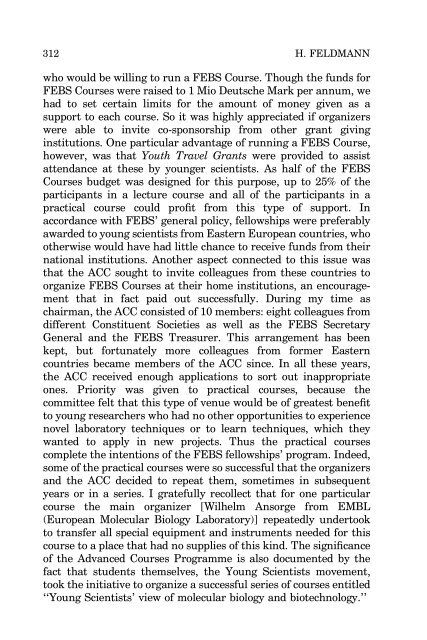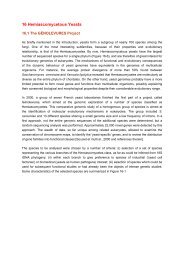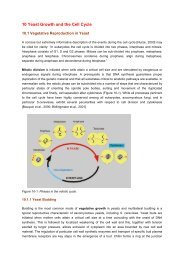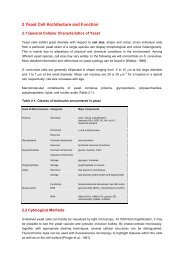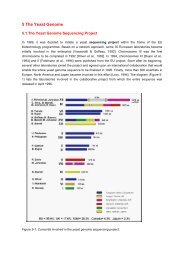A Life with Yeast Molecular Biology - Prof. Dr. Horst Feldmann
A Life with Yeast Molecular Biology - Prof. Dr. Horst Feldmann
A Life with Yeast Molecular Biology - Prof. Dr. Horst Feldmann
You also want an ePaper? Increase the reach of your titles
YUMPU automatically turns print PDFs into web optimized ePapers that Google loves.
312<br />
H. FELDMANN<br />
who would be willing to run a FEBS Course. Though the funds for<br />
FEBS Courses were raised to 1 Mio Deutsche Mark per annum, we<br />
had to set certain limits for the amount of money given as a<br />
support to each course. So it was highly appreciated if organizers<br />
were able to invite co-sponsorship from other grant giving<br />
institutions. One particular advantage of running a FEBS Course,<br />
however, was that Youth Travel Grants were provided to assist<br />
attendance at these by younger scientists. As half of the FEBS<br />
Courses budget was designed for this purpose, up to 25% of the<br />
participants in a lecture course and all of the participants in a<br />
practical course could profit from this type of support. In<br />
accordance <strong>with</strong> FEBS’ general policy, fellowships were preferably<br />
awarded to young scientists from Eastern European countries, who<br />
otherwise would have had little chance to receive funds from their<br />
national institutions. Another aspect connected to this issue was<br />
that the ACC sought to invite colleagues from these countries to<br />
organize FEBS Courses at their home institutions, an encouragement<br />
that in fact paid out successfully. During my time as<br />
chairman, the ACC consisted of 10 members: eight colleagues from<br />
different Constituent Societies as well as the FEBS Secretary<br />
General and the FEBS Treasurer. This arrangement has been<br />
kept, but fortunately more colleagues from former Eastern<br />
countries became members of the ACC since. In all these years,<br />
the ACC received enough applications to sort out inappropriate<br />
ones. Priority was given to practical courses, because the<br />
committee felt that this type of venue would be of greatest benefit<br />
to young researchers who had no other opportunities to experience<br />
novel laboratory techniques or to learn techniques, which they<br />
wanted to apply in new projects. Thus the practical courses<br />
complete the intentions of the FEBS fellowships’ program. Indeed,<br />
some of the practical courses were so successful that the organizers<br />
and the ACC decided to repeat them, sometimes in subsequent<br />
years or in a series. I gratefully recollect that for one particular<br />
course the main organizer [Wilhelm Ansorge from EMBL<br />
(European <strong>Molecular</strong> <strong>Biology</strong> Laboratory)] repeatedly undertook<br />
to transfer all special equipment and instruments needed for this<br />
course to a place that had no supplies of this kind. The significance<br />
of the Advanced Courses Programme is also documented by the<br />
fact that students themselves, the Young Scientists movement,<br />
took the initiative to organize a successful series of courses entitled<br />
‘‘Young Scientists’ view of molecular biology and biotechnology.’’


